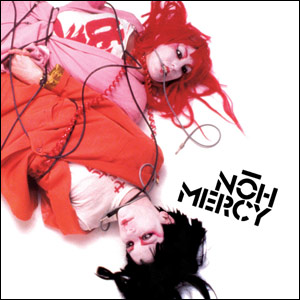
Noh Mercy
Superior Viaduct
Like so many bands of their time, San Francisco’s Noh Mercy burned bright but quickly. A musical bottle rocket existing from 1977 to 1980, they were part of San Fransisco’s nascent punk scene, but aside from the rebellious streak that cut through everything they did, Noh Mercy had little common with the reductionary sounds that one usually associates with that designation. (Admittedly, though, the San Franciscan punks of the era tended to be much more adventurous than their contemporaries elsewhere.) Comprised of two women, surnameless singer and keyboardist Esmerelda and drummer Tony Hotel, the duo lived by the slogan of “no boys on guitar,” and their idiosyncratic brew’s sparse rattle had little need for axe-wielding males.
Of course, also like many of the peers, there’s little issued recorded evidence of Noh Mercy’s existence. Though they contributed a couple tracks to Scottish label Fast Product’s Earcom Three double 7-inch EP, they never released a proper record of their own, so the band’s legacy has largely been preserved in the memories of those around at the time. (There’s a bit of video too, as evidenced on YouTube.) With such memories fading, fortunately the band did take the time to preserve 10 songs to tape in 1979 with Fluxus artist Tommy Tadlock in his basement studio, and those recordings have now finally seen the light of day on a self-titled release on Superior Viaduct. Filled out by another four different songs recorded live in Santa Cruz, the disc is as definitive as it is overdue.
Again, as this CD proves, Noh Mercy had little in common with what’s commonly referred to as punk besides attitude. Hotel, who grew up in Dayton, was a trained musician. She had attended Berklee College of Music briefly and had played with jazz combos in Boston, Dayton and LA. That upbringing is apparent in songs like “Fashion Chant” and lends a musicality to Noh Mercy’s recordings that makes up for their lack of instrumentation. Similarly, Esmerelda sings as much as she shouts, and the approach, combined with her natural charisma, helps fill out the remaining holes. Lyrically, she takes a dynamic, girl-power approach. “No Caucasian Guilt” probably best exemplifies the punk connection as it rails against political correctness and the trespasses of previous generations. In just more than a minute, Esmerelda manages to deftly defy polite conversation and powerfully cement her point of view.
One gets the sense that Noh Mercy live was probably as much performance art as rock. Whatever the case, there’s nothing stilted or contrived about what’s captured here. Indeed, this record’s greatest asset is that it possesses so much vitality. More than three decades may have passed, but Noh Mercy sounds as relevant as ever, and each track still bristles with electric intent. Though the band may be long gone, at the very least, this disc has ensured that Noh Mercy is not forgotten.
Stephen Slaybaugh
PAST PERFECTS
Doug Jerebine, Is Jesse Harper
Poison Idea, Darby Crash Rides Again: The Early Years
Feedtime, The Aberrant Years
Roach Motel, It's Lonely at the Top
Tronics, Love Backed By Force
Archers of Loaf, Vee Vee
Metal Dance
Giant Single: The Profile Records Rap Anthology
Karen Dalton, 1966
Mighty Sparrow, Sparrowmania! Wit, Wisdom and Soul from the King of Calypso 1962-1974
Gaunt, I Can See Your Mom from Here
Alex Chilton, Free Again: The "1970" Sessions
The Lucy Show, Remembrances
Boddie Recording Company: Cleveland, Ohio
